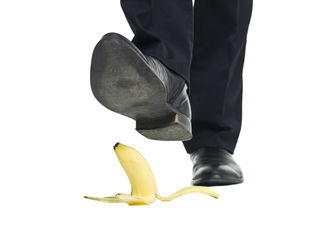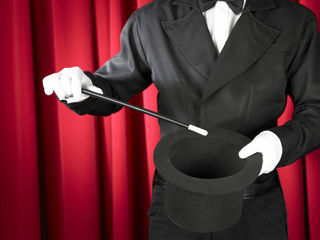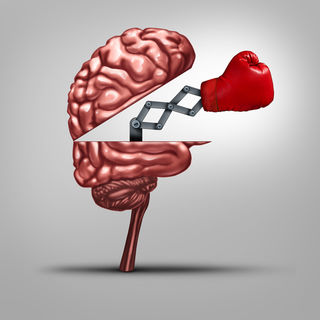OCD
I’m an OCD Therapist With OCD. And I Don’t Do ERP Perfectly
How to turn OCD's little wins into BIG victories for your recovery.
Posted April 23, 2018

I’m at an airport, and I just did a 'compulsion'. Two, in fact. The first one involved calling someone in a sly attempt to get reassurance. What they said only triggered me more, and I ended up making another call in an obvious attempt to fix what OCD was telling me was the problem. And the call did “fix” it, according to my OCD, and my anxiety, of course, then melted away.
OCD: 1. Shala: 0.
Sigh.
Yes, I’m an OCD therapist who has OCD, and I do not do exposure and response prevention therapy (ERP) perfectly, as the vignette above illustrates. Why am I telling you, dear reader, that I did compulsions when I would tell my clients to do the exact opposite? Am I going for “take my advice, I’m clearly not using it?”
No. We can all learn from our slip-ups, and I’m hoping you’ll be able to learn from mine.
OCD Is About Discomfort, Not Content
The reason I slipped up is that I listened to OCD’s threats about the triggering event, plain and simple. I fell for the old “If you don’t do your compulsion, something bad is going to happen” line. To give myself credit, I was worn out from traveling all week and my meditation practice had fallen off in the weeks leading up to this event. I was easy prey for my OCD and its favorite tactic of telling scary stories, forgetting that OCD is not about scary stories (i.e. its "content").
OCD is instead about discomfort.

OCD uses scary stories to make me anxious so that I will do rituals to reduce my anxiety. It tells me I’m doing rituals to prevent a feared outcome from happening, but that’s nonsense. What my rituals accomplished were a slight of hand, a purported “shift of responsibility” to other people so that I could feel better—nothing more, nothing less.
Winning against OCD is about seeing this magic trick for the hocus pocus that it is and taking opportunities to be anxious on purpose, to say, “Oh, thank you, OCD, for giving me this opportunity to be anxious and practice. I’m not going to do what you say, because I want to beat you and keep my life my own.”
So I Screwed Up. Now What?
Obviously, I didn’t take that opportunity to practice. Instead, I once again listened to the monster that made my life miserable for years on end. So should I yell at myself, saying something like, “What the hell, Shala? You’re an OCD therapist, for crying out loud! You know better. Get it together! What kind of example are you setting for others with the choices you are making? You should be ashamed of yourself, you fraudulent hypocrite!!!”
That’s exactly how I used to talk to myself: with vituperative self-hate. But not anymore. I looked at my self-compassion bracelet as I walked through airport security and instead said the following, “I’m going to give myself a break for just doing those compulsions. It’s ok to not be perfect.” This is a shortened version of what’s called a self-compassion statement.
The full version might look something like this:
- Mindful awareness of feelings: “I’m feeling embarrassed and a little ashamed right now that I just did rituals.”
- Common humanity: “Many people with OCD who are worn out and/or off their meditation games might end up doing compulsions, too.”
- Self-kindness:
- Noticing what’s right: “I’m recognizing that I just did rituals, and I'm now choosing not to do any more.”
- Giving myself permission: “I’m allowing myself to mess up every now and then, even though (and maybe especially because) I do ERP therapy for a living.”
- Saying something helpful and kind: “I’m going to give myself a break, recognizing that maybe something useful will come from this. I’m going to allow myself time to watch BBC’s Sherlock Holmes on my iPad for a little while, then I’m going to write a blog post about my experience.”

Self-compassion is critically important when you have OCD. Why? Because just like me, YOU ARE GOING TO MESS UP SOMETIMES! That’s one of the few certainties in life, is that all of us are going to get sucked into doing a compulsion or two (or more!) at some point during recovery.
You can take Dr. Kristin Neff’s self-compassion assessment to see how self-compassionate you are, and if you score on the low end of the scale (as most of us with OCD do before learning about self-compassion), you can start using self-compassion statements to be kinder to yourself. (For more on the use of self-compassion when you have OCD, see Everyday Mindfulness for OCD.) Being-self compassionate is motivating and will make you more likely to achieve your goals in the future than yelling at yourself, even though I know it seems at times like the opposite is true.
Mindfulness Matters
I usually meditate every day for at least ten minutes, but lately, I’ve chosen to let that slip. As a result, my ability to step back from my thoughts and feelings has become weaker, just like our muscles become weaker if we don’t take some time to do strength training each week.
Succeeding at ERP depends heavily on my ability to put just a little space between what OCD is screaming at me and my response to it. If there’s no space, I react (not respond) and do what OCD wants immediately. If I have some space, I can find my all-important welcoming, mindful attitude and respond, “Oh, there you are again OCD. Yes, you’re making me feel quite anxious right now. You’re very good at these scary thoughts. But I have a choice here, and I’m going to choose to put my shoulders back and hope that my anxiety gets even higher. Because that’s how I win, OCD.”
What did I learn from my reaction to my OCD’s threats? That it would be helpful for me to get back into the meditation game. Starting now. So I’m going to get out my Insight Timer app and meditate for 20 minutes with the sound of the aircraft engines humming in the background.

The Upside of Slips Ups
What’s my overall takeaway from my experience? That it’s really good that I slipped up! I got a new blog post out of the experience, hopefully allowing me to use my experience to help others. I used my self-compassion statement, which alleviated my burgeoning shame about what happened. And I’m back on the meditation wagon, which will further strengthen my recovery. What could be better than that?
You, too, are going to slip up. And it’s okay—don’t let OCD or your self-critical voice tell you it isn’t. Because much to OCD’s dismay, the surprising upside of slip-ups is that they just might make your recovery stronger: a big victory for you!
So go out there and do your ERP….imperfectly!




